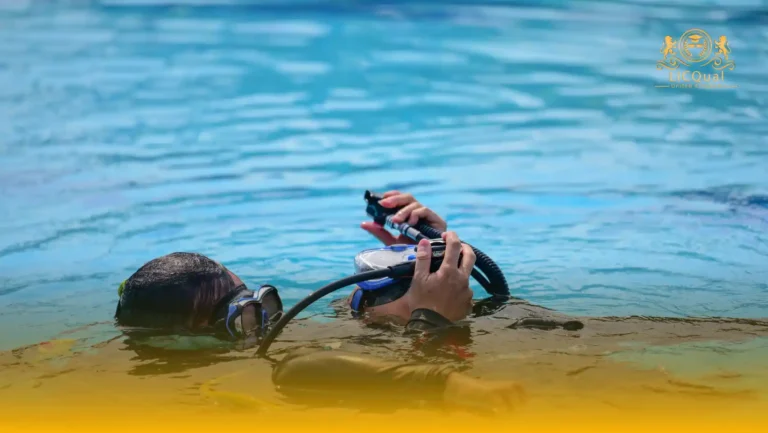The LICQual Award in Aviation Accident Investigation is a highly specialized qualification designed for professionals seeking to master the complexities of aviation incident investigations. Whether you are a safety officer, aviation engineer, or aviation management professional, this course will equip you with the essential skills to investigate aviation accidents thoroughly and effectively.
By focusing on critical investigative methods, root cause analysis, and regulatory compliance, this qualification provides a solid foundation for anyone looking to specialize in aviation safety and accident investigation.
In an industry where safety is paramount, the ability to understand, investigate, and report aviation accidents is crucial for improving safety standards. This course offers an in-depth understanding of aviation accident dynamics, safety protocols, and reporting procedures, making it the ideal qualification for anyone involved in aviation safety, risk management, or aviation compliance.
By completing the LICQual Award in Aviation Accident Investigation, you will gain the skills needed to assess and respond to aviation accidents, ensuring effective risk mitigation and enhancing aviation safety.
The LICQual Award in Aviation Accident Investigation covers all the essential aspects of investigating aviation accidents, from the initial response to final reporting. The course provides participants with detailed knowledge of aviation safety, accident causation theories, and investigative techniques, including data collection, evidence analysis, and root cause analysis. Additionally, learners will explore aviation regulations, safety protocols, and the role of various stakeholders in aviation accident investigations.
This qualification is perfect for professionals working in the aviation industry, including airline safety officers, aviation engineers, flight crew, and air traffic controllers, who wish to gain a deeper understanding of the investigative process. Upon completing the course, participants will be fully equipped to conduct thorough investigations, analyze findings, and contribute to the enhancement of aviation safety standards.
Course Overview
Qualification Title
LICQual Award in Aviation Accident Investigation
Total Units
6
Total Credits
6
GLH
12
Qualification #
LICQ2200062
Qualification Specification
To enroll in the LICQual Award in Aviation Accident Investigation, applicants must meet the following criteria:
|
Qualification# |
Unit Title |
Credits |
GLH |
|---|---|---|---|
|
LICQ2200062-1 |
Introduction to Aviation Accident Investigation |
1 |
2 |
|
LICQ2200062-2 |
Aviation Accident Causation and Risk Assessment |
1 |
2 |
|
LICQ2200062-3 |
Data Collection and Evidence Gathering in Aviation Accident Investigations |
1 |
2 |
|
LICQ2200062-4 |
Investigative Methodologies and Root Cause Analysis |
1 |
2 |
|
LICQ2200062-5 |
Report Writing and Documentation of Findings |
1 |
2 |
|
LICQ2200062-6 |
Legal, Ethical, and Regulatory Considerations in Aviation Accident Investigations |
1 |
2 |
By the end of this course, learners will be able to:
1. Introduction to Aviation Accident Investigation
- Understand the fundamental principles and processes involved in aviation accident investigations.
- Identify the key roles and responsibilities of aviation accident investigators and other stakeholders involved in the investigation process.
- Demonstrate knowledge of the regulatory frameworks governing aviation accident investigations, including international and national guidelines.
2. Aviation Accident Causation and Risk Assessment
- Apply theories and models of aviation accident causation to analyze incidents and identify contributing factors.
- Conduct risk assessments within aviation environments to proactively identify potential hazards and mitigate risks.
- Recognize the importance of systematic analysis in understanding both immediate and systemic causes of aviation accidents.
3. Data Collection and Evidence Gathering in Aviation Accident Investigations
- Employ best practices for gathering and preserving evidence at aviation accident sites, ensuring data integrity and reliability.
- Analyze key sources of evidence such as flight data recorders, cockpit voice recorders, and maintenance logs.
- Conduct interviews and gather testimonies from witnesses, flight crews, and other involved parties to support the investigation process.
4. Investigative Methodologies and Root Cause Analysis
- Utilize investigative methodologies such as Root Cause Analysis (RCA), Fault Tree Analysis (FTA), and Fishbone Diagrams to identify the root causes of aviation accidents.
- Apply these methodologies in a structured manner to understand the sequence of events that led to the incident.
- Analyze complex accident scenarios using these techniques to uncover both direct and contributing causes.
5. Report Writing and Documentation of Findings
- Develop clear, concise, and comprehensive incident reports that communicate investigation findings, conclusions, and recommendations.
- Ensure reports comply with industry standards and are structured to convey technical details in an accessible manner for various stakeholders.
- Demonstrate the ability to document investigation processes and outcomes in a legally compliant and transparent way.
6. Legal, Ethical, and Regulatory Considerations in Aviation Accident Investigations
- Understand the legal and ethical responsibilities involved in aviation accident investigations, including adherence to aviation laws and regulations.
- Navigate the regulatory frameworks set by bodies like ICAO, NTSB, and FAA during the investigative process.
- Ensure confidentiality, transparency, and ethical practices in handling sensitive information throughout the investigation and reporting stages.
This diploma is ideal for:
Assessment and Verification
All units within this qualification are subject to internal assessment by the approved centre and external verification by LICQual. The qualification follows a criterion-referenced assessment approach, ensuring that learners meet all specified learning outcomes.
To achieve a ‘Pass’ in any unit, learners must provide valid, sufficient, and authentic evidence demonstrating their attainment of all learning outcomes and compliance with the prescribed assessment criteria. The Assessor is responsible for evaluating the evidence and determining whether the learner has successfully met the required standards.
Assessors must maintain a clear and comprehensive audit trail, documenting the basis for their assessment decisions to ensure transparency, consistency, and compliance with quality assurance requirements.







